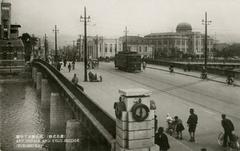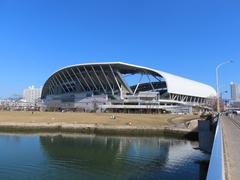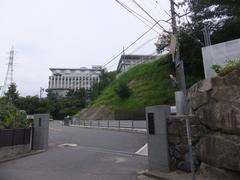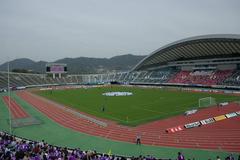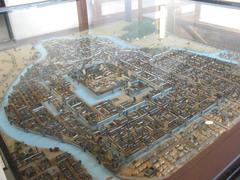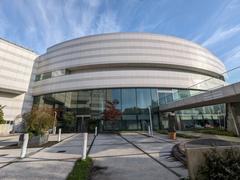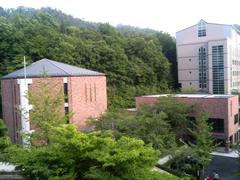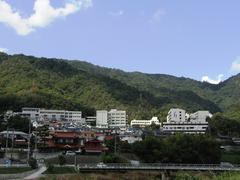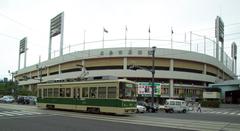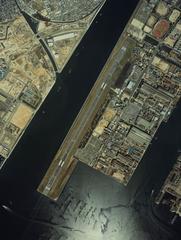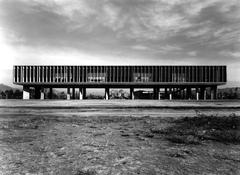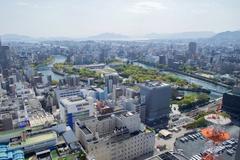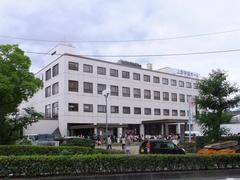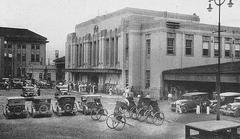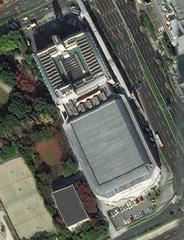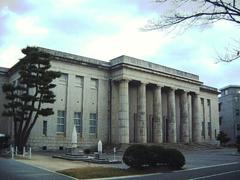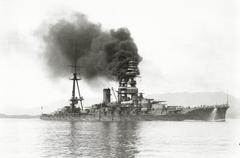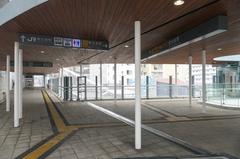Karuga Station Hiroshima: Visiting Hours, Tickets, and Historical Significance
Date: 04/07/2025
Introduction
Karuga Station, situated on the peaceful northern edge of Hiroshima City, serves as both a vital commuter link and a cultural gateway to the rural charm and historical richness of Hiroshima Prefecture. As part of the JR West Geibi and Kabe Lines, it connects urban Hiroshima with picturesque countryside landscapes, ancient temples, and traditional shrines. Since its inception during Japan’s early 20th-century railway expansion, Karuga Station has played an integral role in regional connectivity, local heritage preservation, and tourism development (Railways of Japan; City of Hiroshima).
Visitors to Karuga Station encounter more than just a transport hub. The station’s nostalgic wooden architecture, scenic setting, and community-driven activities offer an authentic introduction to northern Hiroshima’s history and landscapes. This guide delivers essential details on station hours, ticketing, accessibility, nearby attractions, and cultural highlights, ensuring travelers can make the most of their journey.
Table of Contents
- Visiting Hours and Ticket Information
- How to Reach Karuga Station
- Historical Significance and Development
- Architectural Features and Accessibility
- Nearby Attractions and Activities
- Special Events and Guided Tours
- Practical Travel Tips
- Frequently Asked Questions (FAQs)
- Visuals and Media
- Summary and Recommendations
- Sources and Further Information
Visiting Hours and Ticket Information
Visiting Hours
Karuga Station operates in tandem with the Geibi Line schedule. While the building is generally unstaffed, automated ticket machines and IC card readers (such as ICOCA) are available throughout the day. Train services usually begin around 5:30 AM and conclude close to 11:30 PM, but specific times may vary seasonally (Wikipedia; YoMetro).
Ticket Purchase
- Automated Machines: Tickets for any destination on the Geibi and Kabe Lines can be purchased at the station via vending machines.
- IC Cards: ICOCA and other major Japanese IC cards are accepted, enabling convenient tap-in/tap-out travel.
- Passes: The Hiroshima Tourist Pass and Japan Rail Pass are valid for travel on these lines. Purchase online or at major stations prior to your journey.
- Staffed Hours: While the station is usually unstaffed, certain periods may have staff on site for assistance.
How to Reach Karuga Station
- By Train: Take the JR Geibi or Kabe Line from Hiroshima Station. The journey is approximately 30–40 minutes, with regular departures throughout the day.
- By Car: Accessible via National Route 54. Parking is limited, so public transit is recommended.
- By Bicycle: Bicycle parking is available, and the surrounding area is suitable for cycling.
- From Hiroshima Airport: Take the airport limousine bus to Hiroshima Station, then transfer to the JR Kabe Line.
(Rome2Rio)
Historical Significance and Development
Early Railway Expansion and the Geibi Line
Karuga Station’s origins trace back to the Geibi Line’s construction (1915–1923), later integrated into the national network in 1937. Its establishment marked a shift from traditional transport methods to rail, fostering economic and social ties between urban and rural Hiroshima (Railways of Japan).
Role in Regional Connectivity
The station became vital for daily commuters, students, and local businesses, serving as the gateway to rural communities and marking the northern boundary of Hiroshima’s city rail network (City of Hiroshima).
Impact of Natural Disasters
In July 2018, heavy rains caused significant damage to the line between Karuga and Shirakiyama, halting service for over a year. Restoration emphasized the community’s resilience and the importance of rural railways (Railways of Japan).
Architectural Features and Accessibility
Station Design
Karuga Station retains its classic rural Japanese charm, with a single-story, gabled roof building constructed of wood and tile. The layout includes one or two platforms, sheltered waiting areas, and basic amenities (Wikimedia Commons).
Accessibility
- Ramps and Tactile Paving: Available for visitors with limited mobility.
- Elevators: Not universally present; travelers requiring step-free access should plan accordingly.
- Bicycle Parking: Supports eco-friendly exploration.
- Restrooms: Basic facilities are provided; coin lockers may be available at larger nearby stations.
Nearby Attractions and Activities
- Mitaki-dera Temple: Renowned for its tranquil grounds and seasonal foliage.
- Karuga Shrine: A local Shinto shrine reflecting the area’s spiritual heritage.
- Scenic Walking and Cycling Routes: Explore rural landscapes, traditional houses, and river valleys.
- Miyoshi City: Accessible via the Geibi Line, this historic town offers preserved streets and local festivals.
- Peace Memorial Park and Hiroshima Castle: Major sites within Hiroshima City, easily reached via JR lines.
Special Events and Guided Tours
Nakagori Kodo Walking Tours
Organized by the Tekuteku Nakagori Kodo Project, these guided tours depart from Karuga Station and traverse historic paths through scenic countryside. Tours occur on the third Sunday of even-numbered months, covering 4 km in 2–3 hours. Advance registration (at least 10 days prior) is required. Tours are typically in Japanese; non-speakers should consider bringing a translator (Dive! Hiroshima).
Seasonal Festivals and Photography
The area is famous for cherry blossoms in spring and vibrant autumn foliage, attracting photographers and nature lovers. Local community events and historical reenactments are also held throughout the year.
Practical Travel Tips
- Check Schedules: Train times vary by day and season—consult the latest JR West timetable.
- Purchase Tickets in Advance: Especially if unfamiliar with local machines or traveling during busy periods.
- Bring Essentials: Comfortable walking shoes, weather-appropriate clothing, and a camera.
- Accessibility: While ramps and tactile paving are available, the absence of elevators may pose challenges for some travelers.
- Local Etiquette: Maintain cleanliness and be respectful to community members and guides.
Frequently Asked Questions (FAQs)
Q: What are the visiting hours of Karuga Station?
A: The station operates in line with train schedules, usually from 5:30 AM to 11:30 PM.
Q: How do I purchase tickets?
A: Use automated machines at the station, IC cards like ICOCA, or purchase passes in advance at major stations.
Q: Is Karuga Station accessible for disabled travelers?
A: Ramps and tactile paving are provided, but elevators are not always available. Staff assistance may be limited.
Q: Are guided tours available?
A: Yes, walking tours of the Nakagori Kodo area are available on select dates with advance reservation (Dive! Hiroshima).
Q: What attractions are nearby?
A: Mitaki-dera Temple, Karuga Shrine, Miyoshi City, and Hiroshima’s central sites.
Q: Is there Wi-Fi at Karuga Station?
A: Free public Wi-Fi is not provided; portable Wi-Fi devices or Japanese SIM cards are recommended.
Visuals and Media
Explore images of Karuga Station’s nostalgic façade, scenic walking paths, and local events on Wikimedia Commons and through virtual tour links on the Dive! Hiroshima guide.
Summary and Recommendations
Karuga Station is much more than a rural train stop—it is a gateway to the rich history, culture, and natural beauty of northern Hiroshima. Its accessible train services, user-friendly ticketing, and proximity to key attractions make it ideal for both day-trippers and cultural explorers. Guided walking tours and seasonal events provide immersive experiences, while practical amenities cater to a range of travelers. Plan ahead for accessibility needs and consult up-to-date schedules to ensure a seamless visit.
For a rewarding journey, combine your trip to Karuga Station with visits to local temples, shrines, and the broader Hiroshima region. Download travel apps like Audiala for real-time updates and explore additional resources for the most current information.
Sources and Further Information
- Railways of Japan
- City of Hiroshima
- Wikimedia Commons
- Wikipedia
- YoMetro
- Dive! Hiroshima
- Rome2Rio
- Travel + Leisure Asia
- Nomadic Matt
- Explore Hiroshima
Call to Action
Ready to explore the tranquil landscapes and storied heritage of Hiroshima’s north? Download the Audiala app for live train schedules, ticket purchases, and insider travel tips. Follow us on social media for the latest news, event updates, and exclusive content—make your Hiroshima journey memorable with Karuga Station as your starting point!
